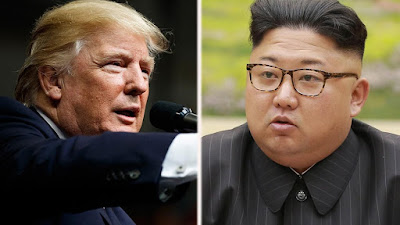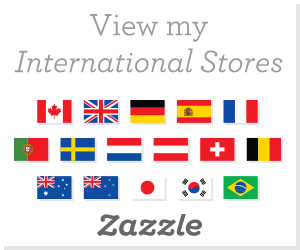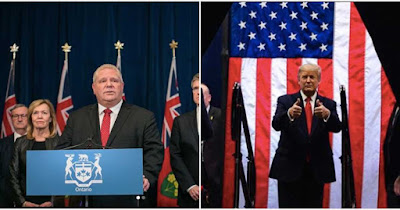Why Trump s economic moves against North Korea may do more to tame Kim than any insult
China’s announcement Saturday
that it would halt exports of some petroleum products to North Korea
and stop importing textiles from the rogue nation is just the latest
evidence that President Trump’s campaign to put economic pressure on
North Korea is beginning to pay dividends.
As part of his efforts to get North Korea to abandon its nuclear weapons and missile programs, President Trump issued a new executive order Thursday that turns up the heat on what he called a “band of criminals” in Pyongyang.
The executive order – issued just 48 hours after the
president’s scathing denunciation of North Korea at the United Nations –
imposes sanctions on any foreign financial institution that conducts or
facilitates “any significant transaction in connection with trade with
North Korea.”
In addition, the order bars ships and planes that have stopped in North Korea from entering the U.S. for 180 days afterward.
While the escalating war of insults thrown back and
forth between President Trump and North Korean leaders is drawing
international attention, the new executive order and other economic
measures aimed at the North could have a greater impact.
Now North Korea is about to feel the full force of U.S. economic pressure, which caused Iran to buckle. Kim Jong Un will face difficult choices as his cash flow begins to wither away
President Trump’s executive order is part of a robust campaign that
is producing results. It gives all governments, companies, and
individuals that want to trade with North Korea a clear choice: do
business with either North Korea or the United States – but not both.
Losing access to America’s $19 trillion market would be a stiff price to
pay.
Although the new executive order has not yet prompted
North Korean dictator Kim Jong Un to halt his provocations and
escalating rhetoric, it puts more pressure on him to end to his nuclear
and missile programs.
China, which accounts for about 90 percent of North
Korea’s foreign trade, is clearly getting the message of U.S. opposition
to its economic support of the North.
Before it announced its new trade restrictions with
North Korea on Saturday, China supported two United Nations sanctions
resolutions imposing trade restrictions against North Korea. In
addition, China’s central bank issued a directive to the country’s banks to cease trade with North Koreans.
China’s behavior bears close watching, since Beijing
has a history of backsliding when the spotlight fades. In addition, it
is not clear if the new banking directive covers financial activity
conducted by Chinese individuals on behalf of North Korea.
President Trump’s new executive order essentially tells
China’s leadership that half measures are not enough. While Treasury
Secretary Steven Mnuchin has said
the new executive order was not directed at China – a statement that is
technically true – the order is certainly directed at precisely the
kind of trade activities Beijing has persistently turned a blind eye to.
The new U.S. policy is modeled on a provision in the Comprehensive Iran Sanctions and Divestment Act of 2010
that targeted business with Iran. Those sanctions put pressure on Iran
to negotiate the controversial agreement that restricted its nuclear
program in return for the lifting of sanctions.
Kim Jong Un should be especially concerned because
President Trump’s executive order is broader than the sanctions imposed
on Iran seven years ago, which targeted only specific Iranian entities
and certain aspects of Iranian trade.
In contrast, President Trump’s new executive order
authorizes the Treasury Department to cut off access to the U.S.
financial system or freeze the assets of any banks that knowingly
conduct significant transactions for sanctioned people or companies that
trade with North Korea.
Mistakenly, many Americans assume that comprehensive sanctions
are already in place on North Korea. In fact, as of July, North Korea
was only fourth on the list of countries with the most people subject to
American sanctions – up from eighth place in early 2016.
More importantly, massive loopholes in the sanctions on
North Korea are now being closed. Until recently, sanctions on the
North were lackluster because they rarely targeted the foreigners –
mainly Chinese and Russian – who facilitate illicit trade.
For example, until now, foreign banks – especially in
China – could process transactions for sanctions evaders without much
concern they would ever pay a price. Now that should change.
President Trump’s new executive order enables the
Treasury Department to target foreign banks that are not asking the
right questions about their “customer’s customer.” These banks now must
find out if the transaction for a company in China, Hong Kong or
elsewhere really hides trade for North Korea or a designated North
Korean entity under the surface.
The new executive order is a warning shot before the
Treasury Department unleashes significant penalties on banks that don’t
ask more probing questions about their customers’ customers.
Now North Korea is about to feel the full force of U.S.
economic pressure, which caused Iran to buckle. Kim Jong Un will face
difficult choices as his cash flow begins to wither away.
We can only hope that this economic warfare convinces
the North Korean regime to step back from threats to explode a hydrogen
bomb over the Pacific or take other provocative action that could lead
to a shooting war with the United States.




Comments
Post a Comment